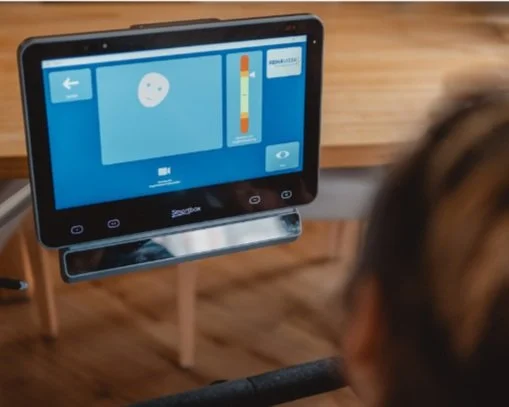Therapy Services
-

Voice Disorders: Assessment & Treatment
Experiencing hoarseness, vocal fatigue, or changes in your voice quality? Our Perth-based speech pathology clinic offers expert clinical assessment and treatment for a wide range of voice disorders. As a member of the Laryngology Society of Australasia, and a singer by background, I closely partner with other specialists in the field such as Physiotherapists, Ear, Nose and Throat Surgeons and Respiratory Physicians to diagnose the root cause of your vocal issues and develop a tailored and holistic treatment plan to restore your natural voice, improve vocal endurance, and enhance overall vocal health.
Using voice evaluation software and other evidence-based techniques and tools, we treat disorders such as Muscle Tension Dysphonia, vocal fold paralysis/paresis, vocal nodules, chronic cough and voice problems arising from neurological disorders such as Stroke, Parkinson’s Disease and Multiple Sclerosis.
We see everyone from teachers and corporate professionals to professional singers and performers.
-

Gender-Affirming Voice
It takes courage and vulnerability to align your voice with your authentic self. We're here to provide a safe space to gently guide and support you through every step of your gender-affirming voice journey. Together, we'll explore techniques that work for you to help you discover a voice that feels truly your own, empowering you to communicate with confidence and comfort.
We use evidence-based, proven and published techniques and provide a supportive and inclusive environment for individuals seeking to align their voice and communication with their gender identity. Our specialised therapy focuses on pitch, resonance, intonation, speech patterns, and non-verbal communication, empowering you to express yourself in the way that makes you feel like you.
-

Accent Modification / Expansion
“When a person has an accent, it means [they] can speak one more language than you” - Frenando Lamas
Having an accent indicates your cultural heritage and shows you have a story to tell. It’s why we call it accent modification or expansion rather than reduction. Modifying or expanding your accent is a worthy goal - communication allows us to connect with others, professionally and personally, and these services can help you focus on the important stuff, rather than solving communication breakdowns. If that’s your goal, we are here to support you to improve your clarity and confidence with our professional accent modification and expansion services.
Whether you're looking to reduce your accent for professional reasons or improve intelligibility, we can help you develop clear, effective communication skills. We offer personalised training to refine pronunciation, stress, and intonation patterns, supporting you in achieving your communication goals.
-

Augmentative and Alternative Communication (AAC)
The right to communication is a basic human right.
For individuals facing complex communication challenges, our clinic offers comprehensive assessment and support for Augmentative and Alternative Communication (AAC). We have strong partnerships with AAC manufacturers, suppliers and other experts such as Occupational Therapists and Biomedical Engineers to help identify and implement personalised AAC strategies and devices for adults with neurological conditions, specialising in high-tech speech-generating devices, to enable effective expression and participation in daily life.
We have specialist expertise in prescription and set-up of high-tech eye-gaze, EMG switches and communication apps to support communication for adults with neurological conditions such as post-stroke or Traumatic Brain Injury, Motor Neurone’s Disease (MND), Huntington’s Disease, Parkinson’s Disease, Progressive Supraneuclear Palsy (PSP), Multiple Systems Atrophy (MSA), Multiple Sclerosis (MS), Dementia and more.
-

Communication for Adult Acquired & Neurological Disorders
Regain communication independence after stroke, brain injury, Parkinson's disease, or other neurological conditions. We provide specialised assessment and therapy for a variety of adult acquired and neurological communication disorders, including aphasia, dysarthria, apraxia and cognitive-communication difficulties. We focus on improving speech clarity, language comprehension, expression, and cognitive skills to enable you to have more enjoyable conversations and meaningful connection with the people that matter most.
With our strong focus on evidence-based communication therapy, we are actively involved in a national clinical trial investigating post-stroke language disorder treatment in collaboration with Edith Cowan University and the Perron Neurological Research Institute. This cutting-edge research ensures we remain at the forefront of advancements in neurorehabilitation, allowing us to provide the most up-to-date, scientifically backed treatments for communication disorders resulting from acquired brain injury or neurological disease.
-

Community Dysphagia Assessment & Mealtime Management (Swallowing Difficulties)
Experiencing difficulties with swallowing? Our speech pathology services include comprehensive community dysphagia assessment and mealtime management. We provide thorough evaluations to diagnose swallowing disorders (dysphagia) and develop practical, individualised and client-centred treatment plans to improve swallowing safety, reduce the risk of aspiration, and enhance quality of life for adults in their home or care environment. We can also provide referrals for instrumental assessment as clinically indicated (Videofluoroscopy and Fiberoptic Endoscopic Evaluation of Swallowing) as well as Mealtime Management Plans for those living at home.
We specialise in advanced dysphagia rehabilitation for individuals recovering from traumatic brain injury (TBI), stroke, or neurological conditions like Parkinson’s disease. By integrating cutting-edge rehab technology with evidence-based techniques—including Expiratory Muscle Strength Training (EMST) and the McNeil Dysphagia Therapy Program (MDTP)—we help you regain confidence and control over your swallow function. Partnering with leaders in rehabilitation innovation, we bring the latest advancements in therapy to support your recovery and enhance your quality of life.
Please note - we are not able to provide support to those requiring tracheostomy care at this time.
